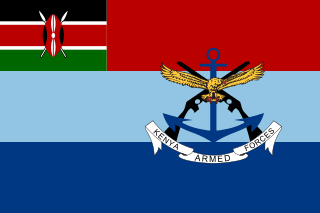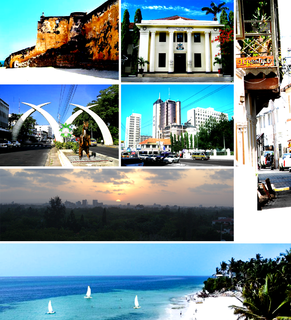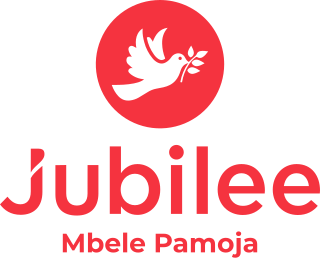
Transport in Kenya refers to the transportation structure in Kenya. The country has an extensive network of paved and unpaved roads.

The Kenya Defence Forces (KDF) are the armed forces of the Republic of Kenya. They are made up of the Kenya Army, Kenya Navy, and Kenya Air Force. The current KDF was established, and its composition stipulated, in Article 241 of the 2010 Constitution of Kenya; it is governed by the KDF Act of 2012. Its main mission is the defence and protection of the sovereignty and territorial integrity of Kenya, recruitment to the KDF is done on yearly basis. The President of Kenya is the commander-in-chief of the KDF, and the Chief of Defence Forces is the highest-ranking military officer, and the principal military adviser to the President of Kenya.

The 2002 Mombasa attacks was a two-pronged terrorist attack on 28 November 2002 in Mombasa, Kenya against an Israeli-owned hotel and a plane belonging to Arkia Airlines. An all-terrain vehicle crashed through a barrier outside the Paradise Hotel and blew up, killing 13 and injuring 80. At the same time, attackers fired two surface-to-air missiles at an Israeli charter plane. The Paradise Hotel was the only Israeli-owned hotel in the Mombasa area. The attacks were believed to be orchestrated by al-Qaeda operatives in Somalia in an attempt to disrupt the Israeli tourist industry on the African continent. Much speculation has occurred as to who the perpetrators are, but no complete list of suspects has been defined. The attack was the second al-Qaeda terrorist operation in Kenya, following the bombing of the U.S. embassy in Nairobi in 1998. Following the attack, the UN Security Council and other nations condemned the bombing.

Kenya, officially the Republic of Kenya, is a country in Eastern Africa. At 580,367 square kilometres (224,081 sq mi), Kenya is the world's 48th largest country by area. With a population of more than 47.6 million in the 2019 census, Kenya is the 29th most populous country in the world. Kenya's capital and largest city is Nairobi, while its oldest, currently second largest city, and first capital is the coastal city of Mombasa. Kisumu City is the third-largest city and also an inland port on Lake Victoria. Other important urban centres include Nakuru and Eldoret. As of 2020, Kenya is the third-largest economy in sub-Saharan Africa after Nigeria and South Africa. Kenya is bordered by South Sudan to the northwest, Ethiopia to the north, Somalia to the east, Uganda to the west, Tanzania to the south, and the Indian Ocean to the southeast. Its geography, climate and population vary widely, ranging from cold snow-capped mountaintops with vast surrounding forests, wildlife and fertile agricultural regions to temperate climates in western and rift valley counties and dry less fertile arid and semi-arid areas and absolute deserts.

Mombasa is a coastal city in southeastern Kenya along the Indian Ocean. The town is known as the white and blue city in Kenya. It is the country's oldest and second-largest city, with a population of about 1,208,333 people according to the 2019 census. Its metropolitan region is the second-largest in the country, and has a population of 3,528,940 people.

The Coast Province of Kenya, along the Indian Ocean, was one of Kenya's eight provinces. It comprises the Indian Ocean coastal strip with the capital city at Mombasa and was inhabited by the Mijikenda and Swahili, among others. The province covered an area of 79,686.1 km² and would have had a population of 3,325,307 in 2009.

Lesbian, gay, bisexual, and transgender (LGBT) persons in Kenya face legal challenges not experienced by non-LGBT residents. Sodomy is a felony per Section 162 of the Kenyan Penal Code, punishable by 14 years' imprisonment, and any sexual practices between males are a felony under section 165 of the same statute, punishable by 5 years' imprisonment. While female same sex-sexual activity is not explicitly prohibited by law, lesbians, bisexual women and transgender people, are not recognised in the Kenyan Constitution, and are discriminated against, covertly, as well as undergo corrective rape practices by heterosexual men. In addition, the country's gross indecency can be used against lesbian women who engage in same sex acts. On 24 May 2019, the High Court of Kenya refused an order to declare sections 162 and 165 unconstitutional. The state does not recognise any relationships between persons of the same sex; same-sex marriage is banned under the Kenyan Constitution since 2010. There are no explicit protections against discrimination on the basis of sexual orientation and gender identity. Adoption is prohibited to same-sex couples.

The Sultanate of Zanzibar, also known as the Zanzibar Sultanate, was a state controlled by the Sultan of Zanzibar, in place between 1856 and 1964. The Sultanate's territories varied over time, and at their greatest extent spanned all of present-day Kenya and the Zanzibar Archipelago off the Swahili Coast. After a decline, the state had sovereignty over only the archipelago and a 16-kilometre-wide (10 mi) strip along the Kenyan coast, with the interior of Kenya constituting the British Kenya Colony and the coastal strip administered as part of that colony de facto.

Kilindini Harbour is a large, natural deep-water inlet extending inland from Mombasa, Kenya. It is 25–30 fathoms (46–55 m) at its deepest center, although the controlling depth is the outer channel in the port approaches with a dredged depth of 17.5 m (57 ft). It serves as the harbour for Mombasa, with a hinterland extending to Uganda. Kilindini Harbour is the main part of the Port of Mombasa, the only international seaport in Kenya and the biggest port in east Africa. It is managed by the Kenya Ports Authority (KPA). Apart from cargo handling, Mombasa is frequented by cruise ships.

The predominant religion in Kenya is Christianity, which is adhered to by an estimated 85.52% of the total population. Islam is the second largest religion in Kenya, practised by 10.91 percent of Kenyans. Other faiths practised in Kenya are Baháʼí, Buddhism, Hinduism and traditional religions.

China–Kenya relations refer to the bilateral relations between the People's Republic of China and Kenya. The two countries established relations in 1963, suspended ties temporarily in 1967, but ultimately re-established diplomatic relations in 1978. Since then, they have significantly expanded their economic and investment agreements, such that China is currently Kenya's largest trading partner. While the robust trade, investment, and Chinese-led infrastructure projects have benefitted Kenya's overall development and have been labelled by both governments as "win-win" collaborations, local media and foreign analysts have increasingly criticized both the potential consequences of Kenya's loans from China as well as Kenya's overall economic dependence on foreign capital and products. The most ambitious collaboration, the Standard Gauge Rail that was planned to connect Nairobi, Kenya, Uganda, South Sudan, and Rwanda using Chinese financing and contractors, has attracted even more controversy due to financial complications, questions on the legality of its tinder process, and the alleged collateralization of Kenya's Mombasa port.
Hassan Ali Joho is a Kenyan politician and the current Governor of Mombasa County affiliated with the Orange Democratic Movement. He was also elected to represent the Kisauni Constituency in the National Assembly of Kenya during the 2007 Kenyan parliamentary election. On 4 March 2013, during the general election, Joho was elected as the first governor of Mombasa County. In 2017 General Elections Day in Kenya held on 8th, August, Joho retained his seat on an ODM ticket and he is still serving as the governor of Mombasa County, County 001. Despite significant politically engineered setbacks, Joho emerged triumphant by winning with 220 576 votes against his closest rival Suleiman Shahbal with 69 322 votes, Suleiman is a member of the Jubilee Party.
Eco-Pesa is the name of a Kenyan community currency, used to reduce poverty and support environmental conservation in a slums areas inside the Kongowea Location, Mombasa District, Kenya. Pesa is the Kiswahili word for money. Eco-Pesa's was in circulation for one year and was considered the pilot that resulted in the more sustainable Bangla-Pesa model of community currencies that have been duplicated in five communities in Kenya and two in South Africa.

General elections were held in Kenya on 4 March 2013. Voters elected the President, members of the National Assembly and newly formed Senate. They were the first elections held under the new constitution, which was approved in a 2010 referendum, and were also the first run by the new Independent Electoral and Boundaries Commission (IEBC). They coincided with the 2013 Kenyan local elections.
From late 2011 to 2014, Kenya experienced an upsurge in violent terrorist attacks. Kenyan government officials asserted that many of the murders and blasts were carried out by al-Shabaab in retaliation for Operation Linda Nchi, a coordinated military mission between the Somalian military and Kenyan military that began in October 2011, when troops from Kenya crossed the border into the conflict zones of southern Somalia. According to Kenyan security experts, the bulk of the attacks were increasingly carried out by radicalized Kenyan youth who were hired for the purpose. Kenya security officials also indicated that they were part of death squads, which carried out many of the killings under the orders of a government security council. By mid-2014, the cumulative attacks began affecting Kenya's tourism industry, as Western nations issued travel warnings to their citizens.
Aboud Rogo Mohammed was a Kenyan Muslim cleric. He was alleged to have been an Islamist extremist and was accused of arranging funding for the al-Shabaab militia in Somalia. He was shot dead in Kenya, and his death triggered protests and violence by hundreds of protestors. Rogo is the fifth alleged Islamic radical killed in Kenya in 2012. David Ochami, a Kenyan journalist, stated that Rogo had the oratory prowess of Hezbollah leader Hassan Nasrallah and the logic of Egyptian ideologue Yusuf al Qaradawi.
On the night of 5–6 July 2014, heavily armed men attacked the Kenyan villages of Hindi in Lamu County and Gamba in Tana River County. At least 29 people were killed in the attacks.

The Mombasa Republic is a proposed state that encompasses the Coast Province of Kenya. The Mombasa Republican Council in the main organisation to raise claims that Mombasa should secede from Kenya to become an independent state. They argued that secession would liberate the people of the coast province from marginalization by the successive governments in Kenya. The slogan they are using is Pwani Si Kenya.

The Jubilee Party of Kenya is the ruling political party of the Republic of Kenya. The party was founded on 8 September 2016, following the merger of 11 smaller parties. During the 2017 election, the Jubilee Party secured a plurality of seats in Parliament and the party leader, Uhuru Kenyatta, was re-elected president.















